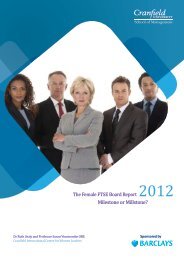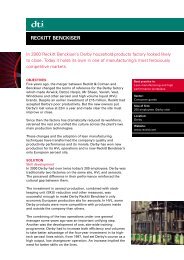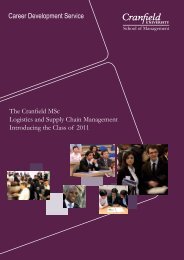Stakeholder Engagement - Cranfield School of Management ...
Stakeholder Engagement - Cranfield School of Management ...
Stakeholder Engagement - Cranfield School of Management ...
You also want an ePaper? Increase the reach of your titles
YUMPU automatically turns print PDFs into web optimized ePapers that Google loves.
Introduction<br />
The terminology <strong>of</strong> stakeholder and stakeholder engagement has become increasingly common<br />
parlance in international business circles in the last decade, particularly with regard to social and<br />
environmental performance 2 .<br />
<strong>Stakeholder</strong>s can be defined as:<br />
<strong>Stakeholder</strong>s can be both local, having detailed information and<br />
opinions on a specific issue or region, or global, engaging directly<br />
with companies at pan-regional headquarters level.The<br />
definitions above apply equally for both local and global<br />
stakeholders.<br />
2.1 The Benefits <strong>of</strong> Engaging with<br />
<strong>Stakeholder</strong>s<br />
The development <strong>of</strong> meaningful relations should add value to<br />
the organisation’s operations by: reducing constraints on business<br />
and increasing the licence to operate; allowing it to plan for the<br />
future, minimising risks and enhancing opportunities by better<br />
understanding the fast-changing PESTE (Political, Economic,<br />
Social,Technological, Environment) context; and, enabling it to<br />
better understand critics and potentially refute, convince or<br />
address criticisms. Furthermore it will enable organisations to<br />
reassure stakeholders that they are on top <strong>of</strong> issues, and in some<br />
cases, be essential for solving problems. It is, therefore, justifiable<br />
in terms <strong>of</strong> time, money and effort expended in their<br />
development and maintenance.<br />
Box 2: Understanding <strong>Stakeholder</strong>s<br />
❖ Anyone who affects or is affected by your organization (R Edward Freeman)<br />
❖ Those groups or persons who have a stake, a claim, or an interest in the operations and decisions <strong>of</strong> the firm...legal,<br />
financial, or moral claim, explicit or implicit contract (Archie B Carroll)<br />
❖ They supply resources that are critical to the success <strong>of</strong> the enterprise (e.g. licence to operate)<br />
❖ They place something <strong>of</strong> value ‘at risk’: i.e. their own welfare is directly “affected by the fate <strong>of</strong> the enterprise”<br />
(e.g. quality, environment)<br />
❖ They have “sufficient power” to affect the performance <strong>of</strong> the enterprise, either favourably or unfavourably<br />
(e.g. mobilise social forces, withdraw labour)<br />
For a list <strong>of</strong> possible stakeholders see Section 3.5.<br />
2.2 Basic Principles <strong>of</strong> <strong>Stakeholder</strong><br />
Participation<br />
Articles by Coimbatore Krishnarao Prahalad, Michael Porter and<br />
others have highlighted the growing consensus in business circles<br />
that the relationship between business and society is now an<br />
issue <strong>of</strong> significant commercial relevance to all organisations. Ian<br />
Davis, the then Global Head <strong>of</strong> McKinsey & Co, writing in the<br />
Economist emphasised the need for CEOs <strong>of</strong> modern large<br />
corporations to take the opportunity to ‘restate and reinforce’<br />
this relationship to help secure the billions invested by their<br />
shareholders over the long term, arguing that there is a new<br />
social contract 3 . Some commentators have described the social<br />
contract as an additional and sixth force in Porter’s widely<br />
recognised and utilised five forces model (see Figure 3) 4 .<br />
2 Sequeira, Debra et al. 2007. <strong>Stakeholder</strong> <strong>Engagement</strong>: A Good Practice Handbook for Companies Doing Business in Emerging Markets. International<br />
Finance Corporation<br />
3 Davies, Ian. 2005. The biggest contract.The Economist<br />
4 Jeffery, Neil. 2007. Towards a Customer Value Model for <strong>Stakeholder</strong> <strong>Engagement</strong>: Understanding the Added Value to Business. Cass Business <strong>School</strong><br />
11<br />
2<br />
Introduction
















